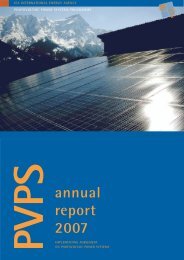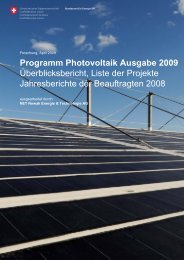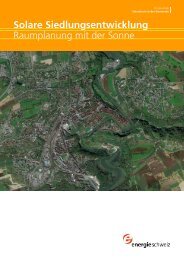Technology Status - NET Nowak Energie & Technologie AG
Technology Status - NET Nowak Energie & Technologie AG
Technology Status - NET Nowak Energie & Technologie AG
Create successful ePaper yourself
Turn your PDF publications into a flip-book with our unique Google optimized e-Paper software.
INTERNATIONAL ENERGY <strong>AG</strong>ENCY<br />
9, rue de la Fédération,<br />
75739 Paris Cedex 15, France<br />
The International Energy Agency (IEA) is an<br />
autonomous body which was established in<br />
November 1974 within the framework of the<br />
Organisation for Economic Co-operation and<br />
Development (OECD) to implement an international<br />
energy programme.<br />
It carries out a comprehensive programme of<br />
energy co-operation among twenty-six* of the<br />
OECD’s thirty Member countries. The basic aims<br />
of the IEA are:<br />
• to maintain and improve systems for coping<br />
with oil supply disruptions;<br />
• to promote rational energy policies in a global<br />
context through co-operative relations with nonmember<br />
countries, industry and international<br />
organisations;<br />
• to operate a permanent information system on<br />
the international oil market;<br />
• to improve the world’s energy supply and<br />
demand structure by developing alternative<br />
energy sources and increasing the efficiency of<br />
energy use;<br />
• to assist in the integration of environmental and<br />
energy policies.<br />
* IEA Member countries: Australia, Austria,<br />
Belgium, Canada, the Czech Republic, Denmark,<br />
Finland, France, Germany, Greece, Hungary, Ireland,<br />
Italy, Japan, the Republic of Korea, Luxembourg,<br />
the Netherlands, New Zealand, Norway, Portugal,<br />
Spain, Sweden, Switzerland, Turkey, the United<br />
Kingdom, the United States. The European<br />
Commission also takes part in the work of the IEA.<br />
© OECD/IEA, 2003<br />
ORGANISATION FOR<br />
ECONOMIC CO-OPERATION<br />
AND DEVELOPMENT<br />
Pursuant to Article 1 of the Convention signed in<br />
Paris on 14th December 1960, and which came<br />
into force on 30th September 1961, the Organisation<br />
for Economic Co-operation and Development<br />
(OECD) shall promote policies designed:<br />
• to achieve the highest sustainable economic<br />
growth and employment and a rising standard<br />
of living in Member countries, while maintaining<br />
financial stability, and thus to contribute to the<br />
development of the world economy;<br />
• to contribute to sound economic expansion in<br />
Member as well as non-member countries in the<br />
process of economic development; and<br />
• to contribute to the expansion of world trade<br />
on a multilateral, non-discriminatory basis in<br />
accordance with international obligations.<br />
The original Member countries of the OECD are<br />
Austria, Belgium, Canada, Denmark, France,<br />
Germany, Greece, Iceland, Ireland, Italy,<br />
Luxembourg, the Netherlands, Norway, Portugal,<br />
Spain, Sweden, Switzerland, Turkey, the United<br />
Kingdom and the United States. The following<br />
countries became Members subsequently<br />
through accession at the dates indicated<br />
hereafter: Japan (28th April 1964), Finland<br />
(28th January 1969), Australia (7th June 1971),<br />
New Zealand (29th May 1973), Mexico (18th<br />
May 1994), the Czech Republic (21st December<br />
1995), Hungary (7th May 1996), Poland (22nd<br />
November 1996), the Republic of Korea (12th<br />
December 1996) and Slovakia (28th September<br />
2000). The Commission of the European<br />
Communities takes part in the work of the OECD<br />
(Article 13 of the OECD Convention).<br />
Applications for permission to reproduce or translate all or part of this publication should be made to:<br />
Head of Publications Service, OECD/IEA<br />
2, rue André-Pascal, 75775 Paris Cedex 16, France<br />
or<br />
9, rue de la Fédération, 75739 Paris Cedex 15, France.







